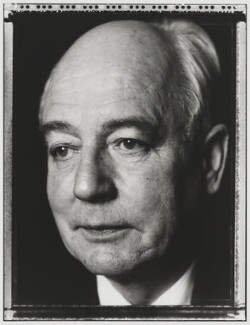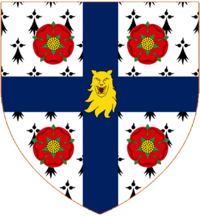David Waddington facts for kids
David Charles Waddington, also known as Baron Waddington, (born August 2, 1929 – died February 23, 2017) was an important British politician and a lawyer. He was a member of the Conservative Party.
He served as a Member of Parliament (MP) in the House of Commons for many years. Later, he became a life peer in the House of Lords. During his time in government, Waddington held several key positions. He was the Chief Whip, then the Home Secretary, and finally the Leader of the House of Lords. After his political career in the UK, he became the Governor of Bermuda from 1992 to 1997.
Quick facts for kids
The Lord Waddington
|
|
|---|---|

Portrait by Nick Sinclair, 1991
|
|
| Governor of Bermuda | |
| In office 11 April 1992 – 2 May 1997 |
|
| Monarch | Elizabeth II |
| Premier |
|
| Preceded by | Desmond Langley |
| Succeeded by | Thorold Masefield |
| In office 28 November 1990 – 11 April 1992 |
|
| Prime Minister | John Major |
| Preceded by | The Lord Belstead |
| Succeeded by | The Lord Wakeham |
| Home Secretary | |
| In office 26 October 1989 – 28 November 1990 |
|
| Prime Minister | Margaret Thatcher |
| Preceded by | Douglas Hurd |
| Succeeded by | Kenneth Baker |
|
|
| In office 13 June 1987 – 24 July 1989 |
|
| Prime Minister | Margaret Thatcher |
| Preceded by | John Wakeham |
| Succeeded by | Tim Renton |
| Minister of State for Immigration | |
| In office 6 January 1983 – 13 June 1987 |
|
| Prime Minister | Margaret Thatcher |
| Preceded by | Timothy Raison |
| Succeeded by | Tim Renton |
| Parliamentary Under-Secretary of State for Employment | |
| In office 5 January 1981 – 6 January 1983 |
|
| Prime Minister | Margaret Thatcher |
| Preceded by | Patrick Mayhew |
| Succeeded by | John Gummer |
| Lord Commissioner of the Treasury | |
| In office 16 May 1979 – 5 January 1981 |
|
| Prime Minister | Margaret Thatcher |
| Preceded by | Alfred Bates |
| Succeeded by | John Wakeham |
| Member of the House of Lords Lord Temporal |
|
| In office 4 December 1990 – 26 March 2015 Life peerage |
|
| Member of Parliament for Ribble Valley Clitheroe (1979–1983) |
|
| In office 1 March 1979 – 29 November 1990 |
|
| Preceded by | David Walder |
| Succeeded by | Michael Carr |
| Member of Parliament for Nelson and Colne |
|
| In office 27 June 1968 – 20 September 1974 |
|
| Preceded by | Sydney Silverman |
| Succeeded by | Doug Hoyle |
| Personal details | |
| Born |
David Charles Waddington
2 August 1929 Burnley, Lancashire, England |
| Died | 23 February 2017 (aged 87) South Cheriton, Somerset, England |
| Political party | Conservative |
| Spouse |
Gillian Green
(m. 1958) |
| Children | 5 |
| Alma mater | |
Contents
Early Life and Education
David Waddington was born in Burnley, Lancashire, England, on August 2, 1929. He was the youngest of five children. Both his father and grandfather were lawyers in Burnley.
He went to two independent schools, Cressbrook School and Sedbergh School. After that, he studied at Hertford College, Oxford, a famous university. While there, he became the President of the Oxford University Conservative Association. In 1951, he became a barrister, which is a type of lawyer who can argue cases in court.
Political Journey
David Waddington tried to get elected to Parliament several times before he succeeded. He ran as the Conservative candidate in different areas in 1955, 1964, and 1966.
His first success came in 1968, when he was elected to Parliament for Nelson and Colne. He won again in 1970 and February 1974. However, he lost his seat in the October 1974 general election by a small number of votes.
Waddington returned to Parliament in March 1979 for Clitheroe. Later, in 1983, he was elected for the Ribble Valley area.
Working in Government
David Waddington served as a junior minister under Prime Minister Margaret Thatcher. From 1979 to 1981, he was a Lord Commissioner of the Treasury and a Government Whip. This meant he helped manage the government's business in Parliament.
He then worked at the Department of Employment from 1981 to 1983. From 1983 to 1987, he was a Minister of State at the Home Office. This department deals with law and order in the country.
From 1987, he became the Chief Whip. This is a very important role where he made sure members of his party voted the way the government wanted. In 1989, he joined the Cabinet as the Home Secretary, one of the most senior government jobs.
Becoming a Life Peer
On December 4, 1990, David Waddington was given the title of Baron Waddington. This meant he became a life peer in the House of Lords, which is the second chamber of the UK Parliament. He served as the Lord Privy Seal and Leader of the House of Lords until 1992.
After that, he became the Governor of Bermuda from 1992 to 1997. This role meant he was the Queen's representative in Bermuda, overseeing the island's government.
In 2008, Lord Waddington proposed an important change to a law, which became known as the Waddington Amendment. This amendment added a freedom of speech clause to new laws. It was designed to protect people's right to express their opinions freely. Lord Waddington retired from the House of Lords on March 26, 2015.
Family Life
David Waddington married Gillian Rosemary Green on December 20, 1958. They had five children together: three sons and two daughters.
Lord Waddington passed away from pneumonia on February 23, 2017. He was 87 years old and died at his home in South Cheriton, Somerset.
Arms
|
 | Misty Copeland |
 | Raven Wilkinson |
 | Debra Austin |
 | Aesha Ash |



